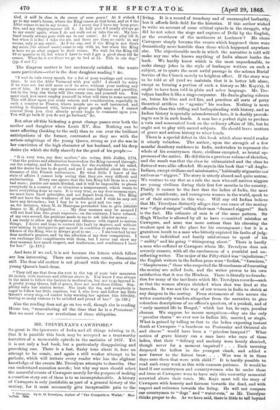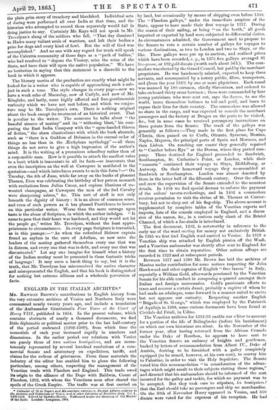MR. TREVELYAN'S CAWNPORE.•
So great is the ignorance of India and all things relating to it, that it is possible this book may be accepted as a trustworthy narrative of a memorable episode in the mutinies of 1857. Yet it is not only a bad book, but a particularly disappointing and provoking one. There is a fast, flashy tone about it, here an attempt to be comic, and again a still weaker attempt to be pathetic, which will irritate every reader who has the slightest knowledge of the events Mr. Trevelyan attempts to describe. One can understand sensation novels ; but why any man should select the mournful events of Cawnpore merely for the purpose of making a sensation story out of them is to us incomprehensible. A history of Cawnpore is only justifiable as part of a general history of the mutiny, for it must necessarily give inexpressible pain to the ,17:llCanniarse; By G. 0. Trevelyan, Author of "The Competition Wallah." Mae. living. It is a record of treachery and of unexampled barbarity, but it affords little field for the historian. If this author wished to write an account of some critical episode in the struggle, why did he not select the siege and capture of Delhi by the English, or the overthrow of the mutineers at Lucknow ? He chose Cawnpore simply because the events which happened there were dramatically more horrible than those which happened anywhere else. The objectionable mode in which the narrative is told will make any one who knows anything of India almost loathe the book. We hardly know which is the most unpardonable, to- make slangy jokes in the style of burlesque writers on such a subject, or to quote the most awful passage in the solemn Burial Service of the Church merely to heighten effect. If the story was to be told at all (and we maintain that it is better left alone, except as forming a portion of such a history as Mr. Kaye's), it ought to have been told in plain and sober language. Mr. Tre- velyan handles it like a stage-carpenter. He daubs glaring colours on, burns his blue and red fire, and practises all sorts of petty theatrical artifices to " agonize " his readers. Nothing is more offensive than this trifling and harlequinading with history, and as Indian history is specially misunderstood here, it is doubly provok- ing to see it in such hands. A man has a perfect right to produce a vain and nonsensical book on the ordinary affairs of life, but he ought not to play with sacred subjects. He should leave matters of grave and serious history to wiser heads.
There is a special defect in this book which alone would render it utterly valueless. The author, upon the strength of a few months' desultory residence in India, undertakes to represent the- whole of his countrymen there, civilians excepted, as brutal op- - pressors of the native. He did this in a previous volume of sketches, and the result was that the class he calumniated and the class he flattered were alike offended. He says in this book that "all Anglo- Indians, except civilians and missionaries," habitually stigmatize iinf natives as "niggers." The story is utterly absurd and quite untrue. We venture to say that as a rule the men who call natives niggers are young civilians during their first few months in the country. Plainly it cannot be the fact that the ladies of India, the most gentle, considerate, and courageous women in the world, speak to - or of their servants in this way. Will any old Indian believe- that Mr. Trevelyan distinctly alleges that one cause of the mutiny was "slips of ensigns" calling their men "damned niggers?" Such is the fact. His estimate of men is of the same pattern. Sir -S Hugh Wheeler is allowed by all to have committed mistakes at Cawnpore, and none was more serious than his choosing the weakest spot in all the place for his encampment ; but it is a gratuitous insult to a man who bitterly expiated his faults of judg- ment by individual and family misfortunes to speak of his " auffity" and his going "whimpering about." There is hardly a man who suffered at Cawnpore whom Mr. Trevelyan does not severely censure, with all the carelessness of a youthful and un- reflecting writer. The major of the Fifty-third was "injudicious;" the English writers in the Indian press were "foolish," "ferocious," "blasphemous ;" those who suspected the Mussulmans of fomenting the mutiny are called fools, and the writer proves to his own satisfaction that it was the Hindoos. There is literally no founda- tion for many of the incidents which Mr. Trevelyan records—such as that the women always shrieked when shot was fired at the barracks. It was not the way of our women in India to shriek at any dangers in the mutiny. From statements of this nature the writer constantly wanders altogether from the narrative to give colourless descriptions of an officer's quarters, of a punkah, and of "early married life in Bengal," which last has, he says, peculiar charms. We suppose he means mosquitoes—they are the only "peculiar charm" we ever saw in Indian life, married, or single. What is gained by telling us that to the ladies expecting instant death at Cawnpore "a luncheon on Peninsular and Oriental ale and cheese" would have been a "priceless banquet?" What notion of grave history can a man have who says of these ladies, that their "delicacy and modesty were hourly shocked, though never for a moment impaired ? . . . Each morning deepened the hollow in the youngest cheek, and added a new furrow to the fairest brow. . . . Woe was it in those days unto them that were with child I" It is hardly possible to read such crazy work as this with common patience. It would be hard if our countrymen and countrywomen who lie under those sad trees at Cawnpore were to have only this unworthy memorial scrawled above their tomb. Mr. Kaye must tell the story of Cawnpore with honesty and fairness towards the dead, and with respect and reticence towards the living. He will nob compare our countrymen to " dogs " and "water-rate," as Mr. Trevelyan thinks proper to do. As we have said, there is little to tell beyond the plain grim story of treachery and bloodshed. Individual acts of daring were performed all over India at that time, and the historian who attempted to record them separately would fail in doing justice to any. Certainly Mr. Kaye will not speak in Mr. Trevelyan's slang of the soldiers who fell, "That day dismissed to Hades many valiant souls of warriors, and left their bodies a prize for dogs and every kind of fowl. But the will of God was accomplished." And no one with any regard for truth will speak of the Calcutta community of those days as a "pack of bullies," who had resolved to "depose the Viceroy, seize the reins of the State, and have their will upon the native population." We have no hesitation in saying that this statement is a discredit to the book in which it appears.
The literary merits of the production are exactly what might be looked for in a writer who is capable of approaching such a sub- ject in such a tone. The style changes in every page—now we have a weak echo of Macaulay, now of Carlyle, and now of Mr. Kinglake, and lastly, some highly affected and fine-gentlemanish verbosity which we have not met before, and which we conjec- ture may be Mr. Trevelyan's own. There is nothing original about the book except its treatment of an historical event. That is peculiar to the writer. The nonsense he talks about "the baneful sirocco of mutiny" and its "withering blast," his com- paring the East India Company with the "open-handed thieves of fiction," the sham classicalisms with which the book abounds, such as "there is a Goddess of Delusion in the eternal order of things no less than in the 2Eschy1ean mythology" — all these things do not serve to give a high impression of the author's mind. It is the writing of a precocious schoolboy rather than of a responsible man. How is it possible to attach the smallest value to a book which is inaccurate in all its facts—so inaccurate that even the inscription on the well at Cawnpore is mutilated in the quotation—and which introduces events to us in this form ?—" On Tuesday, the 4th of June, while far away on the banks of pleasant Thames, Eton was celebrating the birthday of her patron monarch with recitations from Julius Cxsar, and copious libations of un- wonted champagne, at Cawnpore the men of the 2nd Cavalry were sharpening sabres," &c. This sort of stuff is not only beneath the dignity of history : it is an abuse of common sense, and even of such powers as it has pleased Providence to bestow on this particular writer. Worse than the mere outrage upon taste is the abuse of Scripture, in which the author indulges. "It came to pass that their heart was hardened, and they would not let the people go," writes Mr. Trevelyan, without the least appro- priateness to circumstances. In every page Scripture is travestied, as in this passage:—" As when the redoubted Hebrew captain found an asylum in the cave of Adullam, so now unto the leaders of the mutiny gathered themselves every one that was in distress, and every one that was in debt, and every one that was discontented." Let any one imagine for himself what a history of the Indian mutiny must be presented in these fantastic tricks of language ! It may seem a harsh thing to say, but it is the truth, that Mr. Trevelyan has misconceived the native character and misrepresented the English, and that his book is distinguished for nothing but extreme silliness and a wholesale perversion of facts.































 Previous page
Previous page